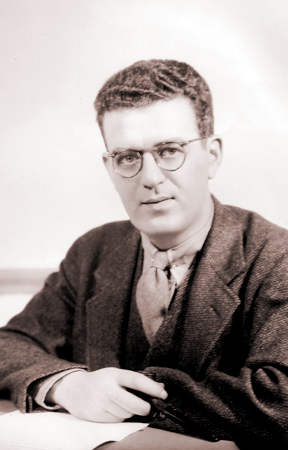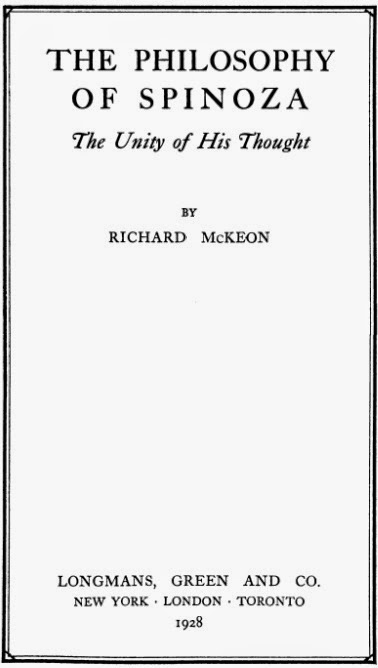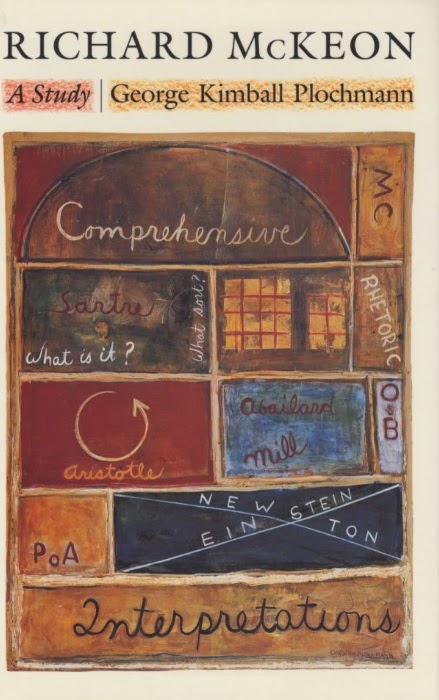Richard McKeon (1900 – 1985) doctoreerde op Spinoza
 Richard McKeon was een belangrijk Amerikaanse filosoof.
Richard McKeon was een belangrijk Amerikaanse filosoof.
“McKeon
obtained his undergraduate degree from Columbia University in 1920, graduating
at the early age of 20 despite serving briefly in the U.S. Navy during the
First World War. Continuing at Columbia, he completed a Master's thesis on Leo
Tolstoy, Benedetto Croce, and George Santayana, also in 1920, and a doctoral
thesis on Baruch Spinoza in 1922. In his doctoral studies, McKeon's mentors
were Frederick J. E. Woodbridge and John Dewey. From Woodbridge, McKeon would
later write, he learned that "what philosophers meant might be comparable
or even identical, despite differences in their modes of expression",
while Dewey taught him how "to seek the significance of philosophic
positions in the problems they were constructed to solve". He then studied
philosophy in Paris, where his teachers included Étienne Gilson, until he began
teaching at Columbia in 1925.” [en.wiki]
Hoe McKeon tot Spinoza kwam
“McKeon had come to Spinoza because "scientific method and its
metaphysical implications" were prominent in philosophy courses in the
early twenties, and this interest led naturally to the seventeenth-century
philosophers, the first "moderns" concerned with these problems. In
Paris he studied Spinoza with Brunschvicg and learned to use historical
analysis as part of the task of dealing with contemporary problems. Although
Spinoza had earlier sent him to medieval thought, studying medieval philosophy
with Etienne Gilson in Paris taught him to find patterns and unity in
philosophical diversity. But these studies made it clear that without its Greek
foundations Western thought was "unintelligible." Thus  he worked with
Leon Robin on Plato and Aristotle.”[In: Zahava
K. McKeon & William G. Swenson (Eds.),
Selected Writings of Richard McKeon: Volume One: Philosophy, Science, and
Culture. University of Chicago Press, 1998. – books.google
he worked with
Leon Robin on Plato and Aristotle.”[In: Zahava
K. McKeon & William G. Swenson (Eds.),
Selected Writings of Richard McKeon: Volume One: Philosophy, Science, and
Culture. University of Chicago Press, 1998. – books.google
Een zo verscheen zes jaar na zijn doctorsthese dit boek over Spinoza
Richard McKeon, The Philosophy of Spinoza: The Unity of His Thought. New York/ London: Longmans, Green, 1928. - ix, 345 pp. Reprinted by Ox Bow, Woodbridge, CT: 1987.
 Het boek wordt niet bij books-google gegeven, hoewel die het
wel digitaliseerde, zoals bij Hathitrust is te zien en waar het gelezen kan
worden [Cf. Hathitrust].
Het boek wordt niet bij books-google gegeven, hoewel die het
wel digitaliseerde, zoals bij Hathitrust is te zien en waar het gelezen kan
worden [Cf. Hathitrust].
Van de "Preface"; "Introduction"; and Pt 2, Ch 6: "The Unity of Spinoza's Thought" van Richard McKeon’s Spinozaboek worden PDF’s gegeven door de RichardMcKeon.org
[Rechts de cover van de reprint van 1987]
Ik citeer hier de eerste voetnoot in de Inleiding:
“It would scarcely be desirable to rarge the whole body of Spinozana according to the epithets employed in them. Apart from the fact that this has been done, though not literally nor exhaustively (Ernest Altkirch, Maledictus und Benedictus, Felix Meiner, Leipzig, 1924), its philosophic importance would be dubious. But lest the statement of the range of disagreement concerning Spinoza seem exaggerated and rhetorical, some examples of each can be adduced with no difrculty. Atheism and pantheism are perhaps the most wide-spread and most frequently repeated of the titles. It will suffice therefore to refer, for atheism, to P. Lami's Athéisme Renversée (Paris, 1696), or to P. Bayle's Dictionnaire Historique et Critique (article Spinoza: "Il a été un athée de système et d’une méthode toute nouvelle. .") or his Pensées diverses-sur les Comètes de I'Année 1680 ("C'étoit le plus grand Athée, qui ait jamais été . , ") (see Freudenthal, Lebensgeschichte Spinoza's (Leipzig, 1889), pp. 28 and, 34, for the Bayle quotations); for pantheism to R. Avenarius, Ueber die beiden ersten Phasen des spinozischen Pantheismus (Leipzig, 1868), This list of either might be increased indefinitely.
Novalis is not only responsible for the phrase "God-intoxicated" but will serve too as example of both idealistic and realistic tendencies in interpretation. (Fragmente vermischten Inhalts ed. J. Minor; Jena, 1907. "27, Die wahre Philosophie ist durchaus realistircher ldealismus - oder Spinozismus (p. 182) . . 355. Spinoza ist ein Gott trunkener Mensch. 356 Der Spinozism ist eine Uebersättigung mit Gottheit." (p. 292) For naturalism see Nourrisson, Spinoza et le Naturalisme Contemporain (Paris, 1886), p. v, "Or, critiquer les enseignements de Spinoza, c'est critiquer ces théories mêmes, qui ne sont que des variétés du Spinozisme, et que I'on appellerait bien en leur appliquant une dénomination commune, le naturalisme contemporain. Car toutes elles concluent d’autre réalité que la nature, c'est-à-dire d’autre réalité que I'Univers des corps."
For nominalism see Pollock (Spinoza, His Life and Philosophy; London, 1899), p. 142. "spinoza's nominalism which we have always to bear in mind, is a suffcient warning against assuming that the 'eternal things' have anything to do with kinds, qualities or classification." Powell (Spinoza and Religion; Chicago, 1906), hopes (p. 150, n. I) "that the traditional habit of referring to Spinoza as a consistent Nominalist will soon be corrected." “
* * *
 George
Kimball Plochmann, die een student van McKeaon was, schreef over hem een boek: Richard McKeon: A Study. University
Of Chicago Press, 1990 – books.google
George
Kimball Plochmann, die een student van McKeaon was, schreef over hem een boek: Richard McKeon: A Study. University
Of Chicago Press, 1990 – books.google
Daarin behandelt hij McKeon’s Spinozaboek [cf. books-google rechtstreeks], die hij met de volgende
evaluatie eindigt:
“This was a doctoral dissertation of exceptional scope, erudition, and clarity, and the author made good almost all of his intent to show how the highly diversified traditions that had fed Spinoza's thought emerged in a unified if complex system. It was an effort to show how, examining a work in its own terms, we must at least take seriously its own tests for meaning, truth, and validity. In so doing we can grasp its wholeness and possible correctness, even where it departs most from previously existing and rival systems.”
[cf. een anecdote uit dat boek in het volgende blog]
_______________

